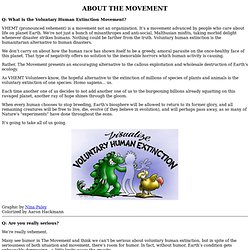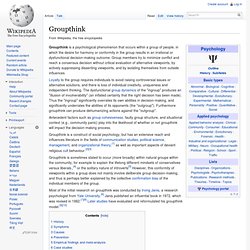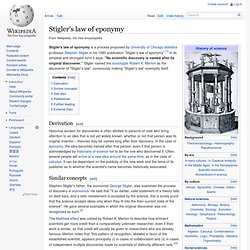

ABOUT THE MOVEMENT. Q: What is the Voluntary Human Extinction Movement?

VHEMT (pronounced vehement) is a movement not an organization. It’s a movement advanced by people who care about life on planet Earth. We’re not just a bunch of misanthropes and anti-social, Malthusian misfits, taking morbid delight whenever disaster strikes humans. Nothing could be farther from the truth. Voluntary human extinction is the humanitarian alternative to human disasters. We don’t carry on about how the human race has shown itself to be a greedy, amoral parasite on the once-healthy face of this planet. Rather, The Movement presents an encouraging alternative to the callous exploitation and wholesale destruction of Earth’s ecology. As VHEMT Volunteers know, the hopeful alternative to the extinction of millions of species of plants and animals is the voluntary extinction of one species: Homo sapiens... us.
It’s going to take all of us going. Graphic by Nina Paley Colorized by Aaron Hackmann Q: Are you really serious?
Economics. Muslim. 6 Reasons North Korea is the Funniest Evil Dictatorship Ever. Some country has to be worst one on Earth, and based on the conversation they heard you having in your hotel room last night, North Korea is really worried that you might think it's them.

Unfortunately for North Korea (and fortunately for us) they're just as bad at looking good as they are at being good, and their attempts to not make their country appear to be a festival of horrors usually end in laughable failure. For instance... The Official North Korea Website Appears to be the Work of a Lone Middle School Child The Problem: Kim Jong-il is a self-proclaimed expert on the Internet, but understandably, Kim was having a hard time getting other people who were not otherwise required by law to believe this. The Ridiculous Solution: ... that 1998 can buy! We'll understand if you're feeling a bit like a kid who's just been set loose at a carnival. There is also a FAQ, full of facts about North Korea, but in question form. Social contract. In moral and political philosophy, the social contract or political contract is a theory or model, originating during the Age of Enlightenment, that typically addresses the questions of the origin of society and the legitimacy of the authority of the state over the individual.[1] Social contract arguments typically posit that individuals have consented, either explicitly or tacitly, to surrender some of their freedoms and submit to the authority of the ruler or magistrate (or to the decision of a majority), in exchange for protection of their remaining rights.

The question of the relation between natural and legal rights, therefore, is often an aspect of social contract theory. The Social Contract (Du contrat social ou Principes du droit politique) is also the title of a 1762 book by Jean-Jacques Rousseau on this topic. Overview[edit] Thomas Hobbes famously said that in a "state of nature" human life would be "solitary, poor, nasty, brutish, and short". History[edit] 31. World Heritage Centre - World Heritage List.
#: As for 19 Natural and Mixed Properties inscribed for geological values before 1994, criteria numbering of this property has changed.

See Decision 30.COM 8D.1. Groupthink. Groupthink is a psychological phenomenon that occurs within a group of people, in which the desire for harmony or conformity in the group results in an irrational or dysfunctional decision-making outcome.

Group members try to minimize conflict and reach a consensus decision without critical evaluation of alternative viewpoints, by actively suppressing dissenting viewpoints, and by isolating themselves from outside influences. Loyalty to the group requires individuals to avoid raising controversial issues or alternative solutions, and there is loss of individual creativity, uniqueness and independent thinking. Stigler's law of eponymy. Stigler's law of eponymy is a process proposed by University of Chicago statistics professor Stephen Stigler in his 1980 publication "Stigler’s law of eponymy".[1] In its simplest and strongest form it says: "No scientific discovery is named after its original discoverer.

" Stigler named the sociologist Robert K. Merton as the discoverer of "Stigler's law", consciously making "Stigler's law" exemplify itself. Derivation[edit] Historical acclaim for discoveries is often allotted to persons of note who bring attention to an idea that is not yet widely known, whether or not that person was its original inventor – theories may be named long after their discovery. In the case of eponymy, the idea becomes named after that person, even if that person is acknowledged by historians of science not to be the one who discovered it. Similar concepts[edit] Stephen Stigler's father, the economist George Stigler, also examined the process of discovery in economics.
See also[edit] Dunbar's number.